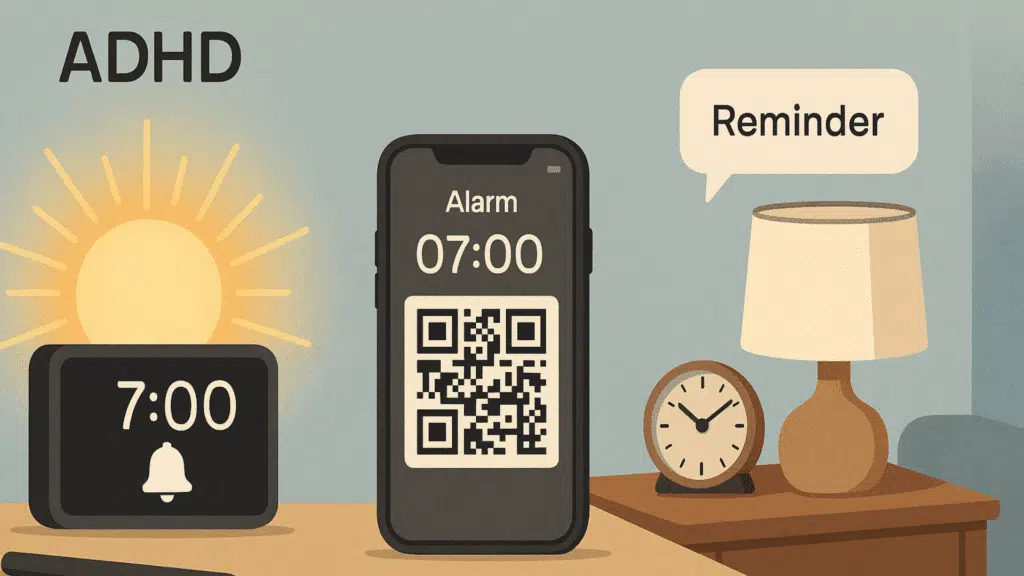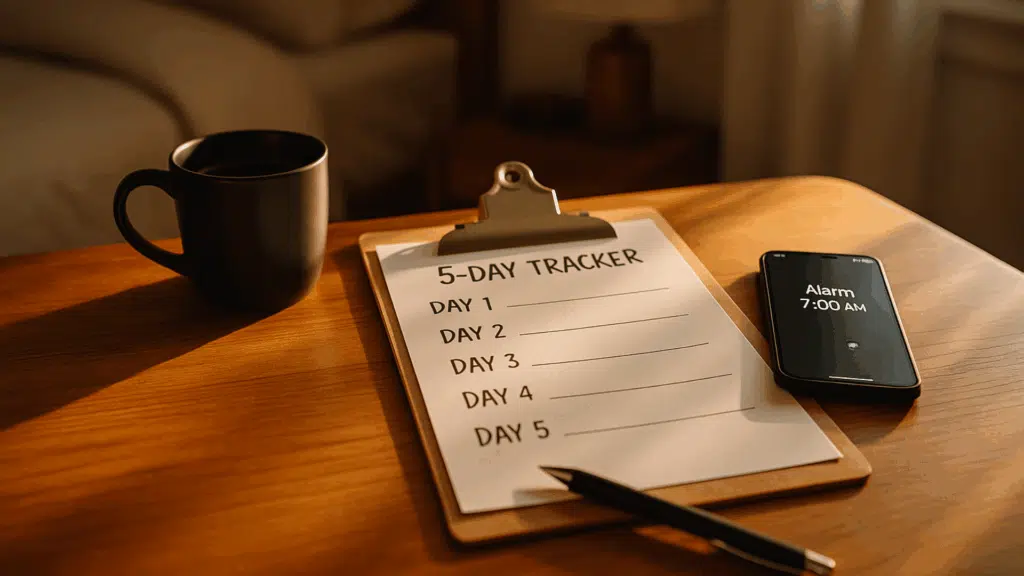I know how it feels to wake up and realize you’ve slept through your alarm again; it’s the worst way to start a morning.
I’ve been there, wondering, why do I sleep through my alarms even when I set three of them the night before? It’s not just laziness or bad timing; there’s usually a real reason behind it.
You may be dealing with deep sleep, stress, or even habits that cause your brain to tune out alarms. In this blog, I’ll walk you through what’s actually happening while you sleep and what you can do to fix it.
By the end, you’ll have a few simple changes that make mornings easier and alarms finally effective.
What It Means When You Sleep Through Alarms
Sleeping through alarms often happens because of how your brain moves through different sleep cycles. During the night, you cycle between light sleep, deep sleep, and REM (the stage during which you dream).
When your alarm goes off during deep sleep, your brain is less responsive to sound. That’s why it can feel like you never even heard it.
Another factor is sleep inertia, the heavy, groggy feeling you get when you wake up too suddenly. It makes it harder to think clearly or react right away.
Why It Happens (Quick Summary):
- If you wake during deep sleep → your brain ignores the alarm.
- If your sleep schedule changes often → your body clock gets confused.
- If you have sleep debt → your brain prioritizes rest over noise.
Common Reasons You Sleep Through Alarms

Several physical, mental, and environmental factors can affect how easily you wake up. Understanding these helps you pinpoint your exact cause and find the right fix.
1. Deep Sleep and Sleep Stages
Deep sleep, also known as slow-wave sleep, is the most restorative part of your sleep cycle. During this stage, your brain activity slows, and your body focuses on repair.
If your alarm rings during deep sleep, your brain may not fully process the sound, making it hard to wake. This often leads to confusion or grogginess known as sleep inertia. You might hit snooze without realizing it or sleep right through the noise.
2. Poor Sleep Habits
Late nights, inconsistent bedtimes, caffeine, or long screen use before bed can confuse your internal clock. These habits push your circadian rhythm out of sync, causing you to fall asleep later and enter deep sleep when your alarm goes off.
Poor sleep timing and lack of routine increase morning sluggishness, making alarms less effective. Keeping a set schedule helps train your body to wake naturally.
3. Sleep Disorders
Conditions like sleep apnea, restless leg syndrome, or delayed sleep phase disorder interrupt normal rest patterns. These issues can cause poor-quality sleep and make waking up harder, even with loud alarms.
People with sleep disorders often wake feeling unrested despite a full night’s sleep. If this happens often, a doctor or sleep specialist can perform a study to find the underlying cause and recommend treatment.
4. Medications and Substances
Certain medications, including sedatives, antidepressants, or sleep aids, can reduce your brain’s responsiveness to alarms. Alcohol has a similar effect, keeping you in heavier sleep phases longer.
If you notice you’re oversleeping after taking medication or drinking, it’s worth discussing alternatives or timing adjustments with your doctor.
5. Psychological and Behavioral Factors
Anxiety, depression, burnout, or ADHD can affect your ability to wake up. Mental fatigue reduces how alert your brain becomes when your alarm rings.
Over time, stress hormones and irregular sleep patterns make it harder to transition from rest to wakefulness. Addressing mental health issues and building a calm bedtime routine can improve how quickly you respond to alarms.
6. Environmental and Physical Conditions
Your surroundings can also influence how your body reacts to alarms. A room that’s too dark, quiet, or overly comfortable can trick your brain into staying asleep.
Low alarm volume or placing your phone too close to the bed makes it easier to snooze unconsciously. Adjust lighting, room temperature, and alarm placement to create a wake-friendly setup.
Quick Overview Table
| Reason | What It Feels Like | Quick Fix |
|---|---|---|
| Deep sleep | You don’t hear the alarm | Try motion-based alarms |
| Stress | You wake tired | Wind-down before bed |
| ADHD | Ignore multiple alarms | Multi-sensory alarm setup |
Connecting Causes to the Right Fix
Not all oversleeping problems have the same solution. The reason you miss alarms depends on your sleep type, habits, or mental state.
Matching each cause with a specific fix gives you a better chance at waking up on time. The goal is to identify your biggest challenge and pair it with the most effective adjustment for your situation.
- If you’re a heavy sleeper, use a loud, vibration-based, or motion-triggered alarm that forces movement.
- If you’re anxious, try gentle alarm tones, morning light, and deep breathing before bed to reduce tension.
- If you’re on medication, experiment with different alarm placements or tones to find one your brain responds to.
- If you’re neurodiverse, combine visual cues, motion-based alarms, or accountability tools like smart lights or partner reminders.
- If your schedule changes often, keep your wake time steady, even on weekends, to reset your body clock.
The Science Behind Alarm Habits and Behavior
Your morning alarm habits are shaped by how your brain builds routines.
When you keep hitting snooze, your brain starts linking that sound with “more sleep” instead of “wake up.” This process, called habit loop desensitization, makes alarms lose their effect over time.
Researchers from the University of Notre Dame (2017, “The Habit Loop and Behavioral Conditioning in Sleep Patterns”) found that repeated cues followed by the same reward strengthen the sleep–snooze cycle.
It follows the cue → routine → reward pattern: the alarm is the cue, snoozing becomes the routine, and a few extra minutes of rest serve as the reward.
To retrain your brain, change the pattern by using new alarm tones weekly, standing up immediately, and rewarding yourself after waking.
Behavior tip: Your brain only needs one new cue to build a new habit.
The ADHD and Neurodiversity Angle

ADHD and other forms of neurodiversity affect how the brain manages focus, motivation, and transitions, including the shift from sleep to wakefulness.
Neurodiverse brains often process sensory input differently, which means traditional alarms may not always trigger an immediate response. This difference isn’t about effort or discipline; it’s about how the nervous system regulates attention and alertness.
People with ADHD, in particular, often deal with sleep inertia and executive dysfunction, which slows the brain’s ability to move from rest to activity. Late nights or inconsistent sleep make this even harder.
Morning struggles like time blindness (losing track of time) and overfocus fatigue (mental exhaustion after long concentration) can make alarms easy to ignore.
To manage this, realistic strategies work best:
- Use multi-sensory alarms combining light, sound, and vibration.
- Try using QR codes or puzzle alarms that prompt you to move or think before snoozing.
- Add external accountability, like text reminders or smart lights that turn on when your alarm rings.
Device-Specific Alarm Troubleshooting
Your phone settings can easily interfere with alarms. A few quick checks and adjustments can make a big difference in waking up consistently.
For iPhone Users
Small setting changes can make your iPhone alarm much more dependable.
First, check that “Change with Buttons” is turned off so your alarm volume stays steady. Review Focus and Bedtime modes, since both can mute alarms without warning.
Enable haptics to combine vibration with sound for a stronger cue. Set multiple alarms spaced a few minutes apart for backup.
You can also use the Bedtime feature, which automatically adjusts alarm tones and volume to match your sleep schedule, helping you wake up more naturally and consistently.
For Android Users
Android phones often silence alarms due to power-saving or notification settings. Allow your alarm app to override Do Not Disturb and the screen lock so it always rings. Disable battery optimization, which can pause alarm apps overnight.
Use vibration and sound together to engage more senses and reduce missed alarms. Try reliable apps like Alarmy or Sleep as Android for smarter wake-up options.
Restarting your phone weekly helps refresh your memory and ensures alarms run smoothly every morning.
How to Stop Sleeping Through Your Alarm
If you’re tired of oversleeping, a few changes can make your mornings easier. These steps target both short-term solutions and long-term habits that help you wake up consistently and feel more alert.
Quick Fixes (Immediate Results)
Sometimes a small adjustment can make the biggest difference the next morning.
- Change your alarm sound: Use a ringtone, your own voice note, or a sound you don’t associate with snoozing.
- Move the alarm away from your bed: Force yourself to stand up to turn it off.
- Drink a glass of water before sleep: Natural urgency can help your body wake on time.
- Use light-based alarms or bed shakers: These engage multiple senses to make waking unavoidable.
Long-Term Fixes (Sustainable Habits)
Building consistent sleep habits prevents oversleeping for good.
- Keep a regular bedtime and wake time: Trains your internal clock to expect morning wake-ups.
- Avoid screens and caffeine after 7 p.m.: Reduces stimulation that delays sleep.
- Create a calm wind-down routine: Dim lights, stretch, or read to cue rest.
- Track your progress: Use a simple sleep log to notice patterns and make adjustments.
The 5-Day Alarm Testing Challenge

This short challenge helps you find what truly works for your body. Each day builds simple habits to improve how quickly you wake up.
Day 1: Write down your bedtime, alarm time, and how long it takes to get out of bed. Identify patterns like snoozing, grogginess, or skipped alarms.
Day 2: Switch to a new tone or ringtone your brain doesn’t associate with snoozing. Move your alarm across the room so you must stand to stop it.
Day 3: Shift your bedtime slightly earlier. This helps your body complete more full sleep cycles and reduces the chance of waking during deep sleep.
Day 4: Expose yourself to natural light or stretch right after the alarm rings. Both actions signal your brain that it’s time to be alert.
Day 5: Use your most effective tone, alarm position, and routine together. Note how easy it feels to wake up compared to earlier days.
When to Seek Medical Help
If you’re constantly exhausted, snore loudly, or sometimes wake up gasping for air, it may point to a sleep-related condition.
Issues like sleep apnea, narcolepsy, or chronic depression can interfere with your body’s ability to wake naturally.
A doctor or sleep specialist can help identify what’s happening through a detailed evaluation or sleep study, which tracks breathing, brain waves, and movement overnight.
Don’t ignore ongoing fatigue or alarm resistance that lasts for weeks. Getting professional support can make a major difference.
Science-Backed Tools and Apps
Using the right tools can make waking up much easier. Sleep experts often recommend pairing sleep-tracking apps with effective alarm devices for better consistency.
Apps like Pillow, Sleep Cycle, Rise, and Sleep as Android analyze your sleep stages and wake you during lighter cycles. Devices such as the Sonic Bomb, Philips SmartWake, and Loftie Clock add light, vibration, or dual alarms for deeper sleepers.
Best for heavy sleepers: Sonic Bomb or Sleep as Android.
Best for ADHD users: Rise or Loftie Clock for multi-sensory alerts.
Best for routine tracking: Pillow and Sleep Cycle for daily sleep data.
Pro Tip: Combine an app and device, one monitors sleep quality, the other ensures you never miss the alarm again.
Wrapping Up
By now, you understand that why do I sleep through my alarms isn’t just about motivation, it’s about how your body and brain respond to rest.
I’ve noticed that even small adjustments, like changing alarm sounds or sticking to a steady bedtime, can completely change how mornings feel.
You can try one tip tonight, maybe move your alarm farther away or use a softer wake-up tone, and see what happens. If it helps, keep building from there. I know it takes time to reset old habits, but every small win counts.
Stay patient, stay curious, and keep finding more of my sleep-focused blogs for simple ways to improve your rest and start each morning feeling alert and ready.









